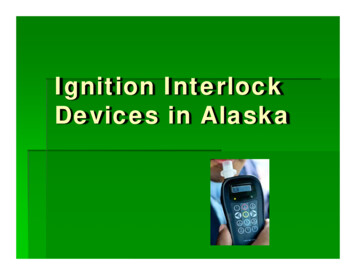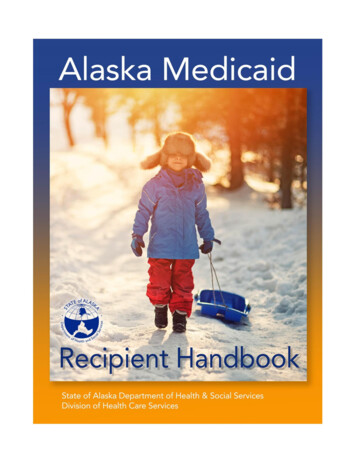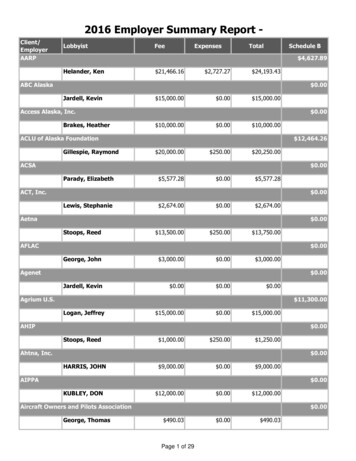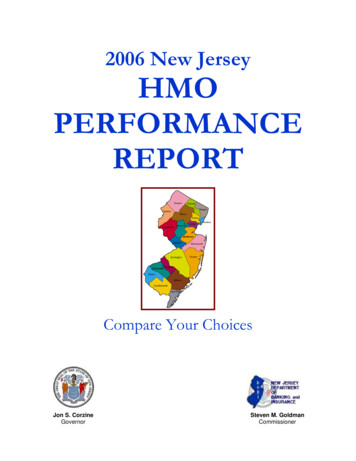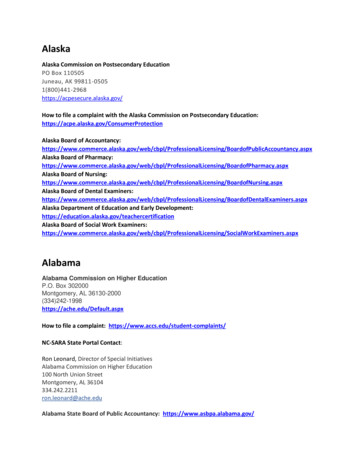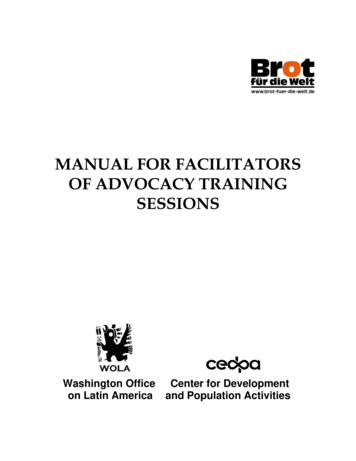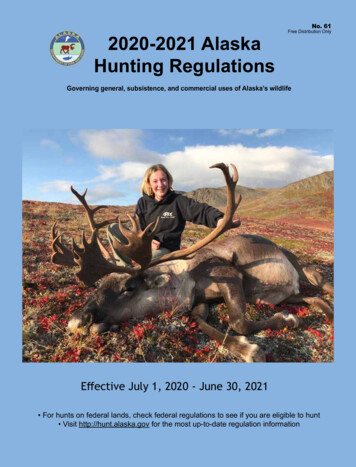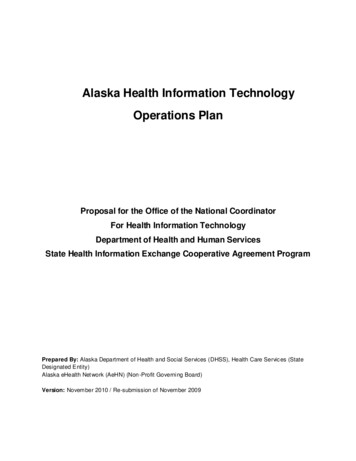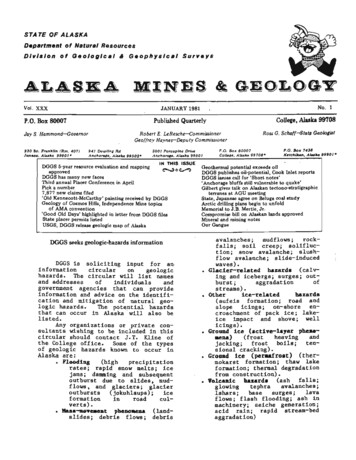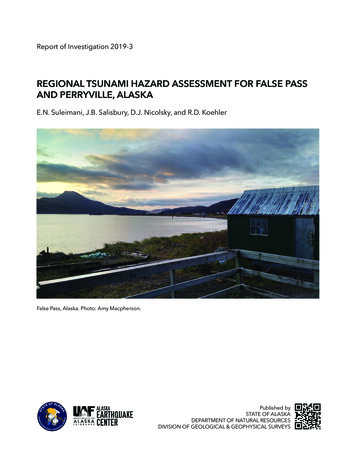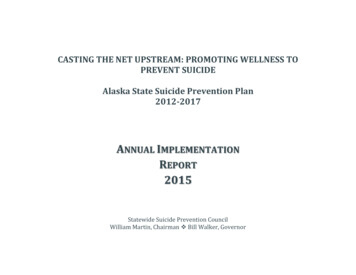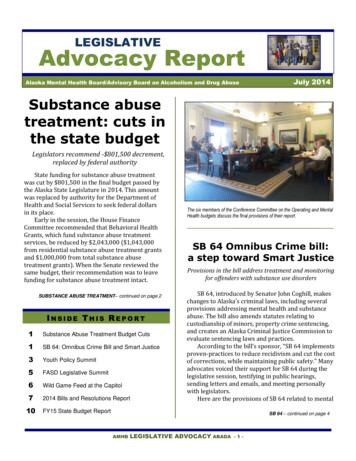
Transcription
LEGISLATIVEAdvocacy ReportAlaska Mental Health Board/Advisory Board on Alcoholism and Drug AbuseJuly 2014Substance abusetreatment: cuts inthe state budgetLegislators recommend - 801,500 decrement,replaced by federal authorityState funding for substance abuse treatmentwas cut by 801,500 in the final budget passed bythe Alaska State Legislature in 2014. This amountwas replaced by authority for the Department ofHealth and Social Services to seek federal dollarsin its place.Early in the session, the House FinanceCommittee recommended that Behavioral HealthGrants, which fund substance abuse treatmentservices, be reduced by 2,043,000 ( 1,043,000from residential substance abuse treatment grantsand 1,000,000 from total substance abusetreatment grants). When the Senate reviewed thesame budget, their recommendation was to leavefunding for substance abuse treatment intact.SUBSTANCE ABUSE TREATMENT– continued on page 2INSIDE THIS REPORT1Substance Abuse Treatment Budget Cuts1SB 64: Omnibus Crime Bill and Smart Justice3Youth Policy Summit5FASD Legislative Summit6Wild Game Feed at the Capitol72014 Bills and Resolutions Report10The six members of the Conference Committee on the Operating and MentalHealth budgets discuss the final provisions of their report.SB 64 Omnibus Crime bill:a step toward Smart JusticeProvisions in the bill address treatment and monitoringfor offenders with substance use disordersSB 64, introduced by Senator John Coghill, makeschanges to Alaska’s criminal laws, including severalprovisions addressing mental health and substanceabuse. The bill also amends statutes relating tocustodianship of minors, property crime sentencing,and creates an Alaska Criminal Justice Commission toevaluate sentencing laws and practices.According to the bill’s sponsor, “SB 64 implementsproven-practices to reduce recidivism and cut the costof corrections, while maintaining public safety.” Manyadvocates voiced their support for SB 64 during thelegislative session, testifying in public hearings,sending letters and emails, and meeting personallywith legislators.Here are the provisions of SB 64 related to mentalFY15 State Budget ReportSB 64 – continued on page 4AMHBLEGISLATIVE ADVOCACY ABADA - 1 -
SUBSTANE ABUSE TREATMENT– from page 1When the discrepancy was presented in theConference Committee, the memberscompromised and removed the 801,500 fromthe base state budget, replacing it with federalreceipt authority – which allows theDepartment of Health and Social Services theauthority to seek federal dollars to replace thestate dollars.Advocates sent letters and emails, called infor public testimony, and met personally withlegislators to tell their personal stories andinform them about the importance ofsubstance abuse treatment.Here are some of the talking pointsadvocates shared with legislators: Substance abuse is a major contributingfactor in Alaska's high rates of DUI (DrivingUnder the Influence), domestic violence,and other crimes. Increased access toresidential substance treatment is needed,not less.Other states have found that spending ontreatment saves spending for more costlyservices down the road in Office ofChildren’s Services, Juvenile Justice,Corrections, and emergency care. Residential substance abuse treatmentcosts less than prison and helps preventrecidivism. Residential substance abuse treatmenthelps people develop skills to supportthemselves to stay stable, employed,housed, and contributing productively inthe community. People seeking treatment report that thelong waiting period for a residential bedprevents them from getting treatmentwhen they are ready. Timely access iscritical.People who have been court-ordered toparticipate in residential treatment aremore likely to fulfill the requirements oftheir sentence, probation/parole whenthey have timely access to treatment.AMHBBefore the next legislative session begins inJanuary 2015, advocates are encouraged to sendletters and emails and visit their legislators inperson and communicate their opinions onsubstance abuse treatment. Go to www.akleg.govto find individual legislators’ contact information. Advocacy Tips Write a letter-to-the-editor about an issue you care about, or coordinate a letter campaign.Make a telephone call to a public official’soffice or coordinate a telephone campaign.Write a letter to a public official or coordinatea letter-writing campaign.Host a reception in your home or place of work.Make five new contacts and spread the wordabout an issue.Set up a table at a public event, party, orreception and raise awareness about an issue.Visit a legislator in your hometown and talkabout an issue that matters to you.Write an opinion piece for your localnewspaper or find someone else to do it.Go on a radio talk show and discuss and issue,or find someone else to do it.Write your personal story and send it to apolicy-maker.Tell your personal story at a public meeting(Assembly, City Council, Rotary, Chamber,School Board, State Legislature).Participate in the Alaska Mental Health TrustAuthority’s legislative teleconferences.Coordinate a local advocacy effort in yourcommunity – involve the media, hostreceptions, write letters, coordinate volunteers,visit policymakers, etc.To join the statewide Action Network sponsoredby the Alaska Mental Health Trust Authority, go tohttp://cqrcengage.com/mhtrustLEGISLATIVE ADVOCACY ABADA - 2 -
was attended by Representatives Gara, Hughes,and Keller; Senators Wielechowski, Dyson, andFrench; and Jeff Jessee, CEO of the Alaska MentalHealth Trust Authority. The receptionconcluded with an “open mic” where youth andadults took turns singing and playing guitar forthe rest of the group.The Alaska Youth Summit is possible thanksto partners Alaska Youth and Family Network(AYFN), Facing Foster Care in Alaska (FFCA),Alaska Native Justice Center, Alaska YouthAdvocates, P.O.W.E.R., and Juneau YouthServices. The summit was organized by TeriTibbett, AMHB and ABADA advocacycoordinator. Participants of the 2014 Youth Policy Summit pose at the legislativereception on the last evening.Youth Policy SummitAlaskan youth meet in Juneau for advocacytraining and meetings with policymakersThe Alaska Youth Policy Summit invites Alaskanyouth ages 18-24 who have had direct experiencewith Alaska’s social services system – foster care,residential care, substance abuse and/or mentalhealth treatment, residential psychiatric treatment(in or out of state), juvenile justice, Office ofChildren’s Services (OCS), homeless services, etc. –to offer their ideas and perspectives to legislatorsand policymakers in Juneau. Funding for the summitis provided through the boards’ Family Voiceproject.The Alaska Youth Summit included teambuilding and shared experience exercises, learningabout state policies on youth in transition, learninghow to develop and tell your personal story topolicy-makers (with lots of role playing andpractice), one-on-one meetings with state legislatorsand/or staff at the State Capitol, and a legislativereception. The goals of the summit are to helppolicymakers better understand the perspectives ofyoung people and for youth participants to becomeeffective advocates for issues they care about.On the final day of the summit, participants metwith legislators about the issues that each caredabout. In the evening, Youth Policy Summitparticipants hosted a reception for legislators whichAMHBTop: Adult mentor, Rene Rouzan from the Alaska Native JusticeCenter, addresses Youth Policy Summit participants on the first dayof the summit. Bottom: Adult mentor Henry Wyatt of Juneau YouthServices plays guitar behind the caterer during the Open Mic eventon the last evening of the summit.LEGISLATIVE ADVOCACY ABADA - 3 -
SB 64– from page 1 Probation and Parole Accountability withCertain Enforcement (P.A.C.E.). This is anintensive form of probation/parole for felonswho are at high risk of violating theconditions of their probation/parole. It relieson swift and certain sanctions to deteralcohol or drug use and other probationrequirements. Offenders on P.A.C.E. are 55%less likely to be arrested for a new crime,72% less likely to use drugs, 61% less likelyto skip appointments, and ultimately 53%less likely to have their probation revoked.P.A.C.E. leads to 48% fewer days in prison. SB64 expands the program statewide. Recidivism Reduction Fund: This fund willsupport transitional re-entry programs forthose recently released from prison –including support for structured and soberenvironments, treatment, and employmentopportunities. According to DOC,approximately two-thirds (2/3) of offendersreturn to prison within three years of theirrelease. In states where supportive programsare implemented, there are fewer offenderscommitting new crimes and returning tocustody.health and substance abuse treatment: Credit for time served in residentialtreatment. A person will receive creditagainst a sentence for time spent in aresidential treatment facility with someconditions. Assessments of prisoners. This requiresthe Department of Corrections (DOC) toconduct a risk-needs assessment on alloffenders incarcerated for 30 days or longer,in order to better understand the offenderpopulation and link inmates to treatmentwithin the facilities. PTSD/TBI mitigating factor. This allows ajudge to take into consideration whether anoffense was related to combat-related PostTraumatic Stress Syndrome (PTSD) ortraumatic brain injury (TBI). This mitigatoris not available for crimes of serious injurysuch as assault or sexual crimes. Electronic Monitoring. This section givesDOC the ability to place first-time DUI(Driving Under the Influence) offenders onelectronic monitoring for the 72-hourmandatory minimum. This is an option thatcurrently exists for municipalities likeAnchorage, but is not available to the rest ofthe state in Alaska statute. ElectronicMonitoring costs 21/day, compared to 158/day for prison, and has shown to be aneffective and inexpensive approach tooffender supervision. Screening for Fetal Alcohol SpectrumDisorders (FASD) and other brain-baseddisabilities. This provision requires DOC toprovide screening and assessment foroffenders who “may be vulnerable to harm,exploitation, or recidivism as a result of fetalalcohol syndrome, fetal alcohol spectrumdisorder, or another brain-based disorder.” Itis the goal of DOC to place people with brainbased disorders in units, similar to mentalhealth units that use appropriate evidencebased interventions that address thesespecific disabilities. Establishes 24/7 Sobriety Program. Thisprogram requires twice-a-day testing forsubstance use for certain offenders, and canbe court-ordered before or after sentencing.Swift and certain sanctions are immediatelyimplemented for those testing positive. Theprogram has shown to reduce recidivism,domestic violence, and drunk driving whereit has been used. Mental health seat on the Alaska CriminalJustice Commission. The bill requires thechief executive officer (CEO) of the AlaskaMental Health Trust Authority, or the CEO'sdesignee, to sit on the newly formed AlaskaCriminal Justice Commission.AMHBNote: As of July 11, SB 64 has not been signedinto law, however the Governor’s office hasannounced a signing ceremony is forthcoming. LEGISLATIVE ADVOCACY ABADA - 4 -
2014 FASDLegislative SummitAlaskans gather to discuss issues and meet withlegislators about fetal alcohol spectrum disordersMembers of the Alaska FASD Partnership met inJuneau in March for a three-day summit to discussstatewide issues and meet with legislators aboutrelated to fetal alcohol spectrum disorders (FASD).On the first day, summit participants attended anadvocacy training. They practiced how to tell theirpersonal story in a few minutes, and outlined whateach wanted the policymaker to know andunderstand about FASD. Then, on the second day,participants met with legislators at the State Capitol,putting into practice what they’d learned the daybefore.In addition to meeting with legislators, summitparticipants met to identify a mechanism for servingpeople in rural communities who deal with extremebehaviors related to FASD, traumatic brain injury(TBI), and/or trauma. The group brainstormed ideasfor how behavioral specialists might collaboratewith local behavioral health aides, parents, teachersand the community to better understand and servechildren and adults who experience extremebehaviors. They met with Reta Sullivan, whomanages the Complex Behavior Collaborative,Division of Behavioral Health, and Jeff Jessee, chiefexecutive officer of the Alaska Mental Health TrustAuthority.Overall, the summit offered a chance to educatelegislators about the needs of people who areaffected by fetal alcohol spectrum disorders, andtake the first steps toward addressing a dilemmamany rural communities face. Participants includedFASD advocates and experts from all over Alaska.The boards’ advocacy coordinator, Teri Tibbett,organized the summit.AMHBParticipants in the 2014 FASD Legislative Summit meet withJeff Jessee, CEO of the Alaska Mental Health Trust Authority.In 2013-14, Senator Pete Kelly, co-chair of theSenate Finance Committee, convened a group ofAlaskan leaders to address FASD, calling theeffort Empowering Hope, an initiative toprevent fetal alcohol spectrum disorders inAlaska. Their recommendations include:Support programs designed to eradicate FASDfrom Alaska.Support a public awareness campaign designedto inform, move, and motivate state residents inan effort to transform social norms regardingfetal exposure to alcohol.Support expanding residential substance abusetreatment services for women who are pregnantand concurrently suffering from drug/alcoholaddiction.Support developing and using a screening toolthat will effectively and quickly screen for FASD,something particularly needed within theDepartment of Corrections.Support developing a community network of“Natural Helpers” who actively help createpositive social norms in Alaska communities.Support strategies that minimize the risk ofprenatal exposure to alcohol, and promoteprograms that reduce the time betweenconception and knowledge of the pregnancy.LEGISLATIVE ADVOCACY ABADA - 5 -
Wild Game FeedBoard members host the annual event forlegislators and staff at the State CapitolClockwise from top left: ABADA chair, Alavini Lata, welcomeseveryone on behalf of the boards; Rep. Bryce Edgmon fills his plate;board members Debi Keith and Charlene Tautfest enjoy a moment ofconversation; board member Ramona Duby talks with Rep. Les Gara;Rep’s Neal Foster and Lance Pruitt enjoy the food; fixings from theWild Game Feed.AMHBLEGISLATIVE ADVOCACY ABADA - 6 -
2014 Bills and Resolutions ReportThe following bills and resolutions passed in2014 were of interest to the Alaska MentalHealth Board and Advisory Board on Alcoholismand Drug Abuse. Go to: www.akleg.gov and clickon Bills & Laws, then type the bill number intothe Search box to read about these bills.Bills Passed in 2014SB 64 - Omnibus Crime, Corrections by Sen.John Coghill (see article on page 1). This billaddresses recidivism in a variety of areas,including: creating the Alaska Criminal JusticeCommission to evaluate sentencing laws andpractices; amends statutes regarding jail timecredit for offenders in court-ordered treatmentprograms; allows the Department of Corrections(DOC) to establish a program that includesrandom drug and alcohol testing as a condition ofprobation and the Parole Board to establish asimilar program for parolee; establishes a 24/7sobriety program for defendants on bail chargedwith alcohol- or substance-abuse-related crimes,or ordered as a condition of probation for felons;requires establishment of a statewide Probationand Parole Accountability with CertainEnforcement (P.A.C.E.) program; establishes newprovisions for addressing electronic monitoringand adds mitigating factors for people who haveexperienced combat-related Post TraumaticStress Disorder (PTSD) or Traumatic Brain Injury(TBI); requires DOC to provide assessment/screening for offenders who may be vulnerable toharm, exploitation, or recidivism as a result offetal alcohol syndrome, fetal alcohol spectrumdisorder, or another brain-based disorder; raisesthe monetary thresholds for certain theft andproperty crimes;, and establishes the RecidivismReduction Fund to provide grants to programsthat address re-entry, rehabilitation, and thereduction of recidivism.AMHBSB 108 – Confidentiality of Certain CriminalCases by Sen. Fred Dyson. This bill requires theCourts to “treat as confidential” records ofcertain criminal cases after acquittal ordismissal. The House added language requiringthat the dismissal was not part of a pleaagreement in another case. The bill providesexceptions for accessing confidentialinformation by 1) state agency employeesresponsible for health, safety, welfare, orplacement of a child, a person with a physical orintellectual disability, or a person with a mentalillness; 2) employees that protect othervulnerable citizens; and 3) state criminal justiceinformation network users.HB 127 – Ombudsman by House RulesCommittee. The bill amends the OmbudsmanAct in the areas of confidentiality; procurement;procedure for investigative reports; and thehiring of retired state employees on contractwith the ombudsman’s office. It exemptscertain executive branch documents from thePublic Records Act and adds a provisionprotecting state agencies that share attorneyclient privileged material with the ombudsman.Language was removed from the original billthat gave the Ombudsman jurisdiction toinvestigate administrative actions of the AlaskaBar Association, and which extended theOmbudsman’s jurisdiction to certain types ofcontractors, that included halfway houses,services to youth in DJJ and OCS custody, andresidential psychiatric treatment facilities.SB 159 - Air Ambulance Services by Sen.Stedman. This bill directs the Division ofInsurance to reinstate a regulatory exemptionthat allows air ambulance providers to offermedevac services through an affordablemembership program for Alaskans. ThisBILLS AND RESOLUTIONS – continued on page 8LEGISLATIVE ADVOCACY ABADA - 7 -
BILLS AND RESOLUTIONS– from page 7program is particularly important for people wholive in rural and remote locations who requireemergency transport to hospitals when levels ofcare are not locally available. The cost of medevacservices can exceed 80,000.SB 171 – Multidisciplinary Child ProtectionTeams by Sen. John Coghill. This bill expandscapacity to recruit multidisciplinary protectionsteams (MDTs) for assisting law enforcement incriminal investigations involving an alleged crimeagainst a child; clarifies participation andconditions the team; adds a representative from aNative group, if applicable, and a representativefrom the Division of Juvenile Justice; clarifies theability of members of the MDT to refer cases (notjust Office of Children’s Services (OCS));mandates monthly meetings; clarifies thatinvestigations and interviews can be conductedby investigative agencies other than OCS.SB 173 - Synthetic Drugs by Sen. Kevin MeyerThis bill bars a person from offering, displaying,marketing, advertising for sale, or selling illicitsynthetic drugs, defines “synthetic drug,” and listswhen a synthetic drug is considered “illicit.” Itamended to make the Dept. of Public Safely (DPS)the enforcing agency and requiring DHSS tocooperate with DPS. The final bill establishes afine of up to 500 for a person found guilty of aviolation under this law.SB 186 – Controlled Substances AdvisoryCommittee by Sen. Fred Dyson. This bill requiresthe Controlled Substances Advisory Committee tomeet at least twice annually.HB 210 - Schools, Restraint, Seclusion, Crisisby Rep. Charisse Millett. The bill requires districtsto include policies in their disciplinary and safetyprograms regarding the use of restraint andseclusion. It also requires policies be madeavailable to students, parents and the public.Districts would also be required to report toparents and guardians any incidents involvingtheir children that resulted in restraint orseclusion by school personnel within 24 hours.The bill requires DEED to approve crisisintervention training programs for schools to usein training their staff. HB 210 defines under whatcircumstances students may be physicallyrestrained, escorted or secluded, and requiresdistricts to report data on a number of restraintand seclusion incidents annually.HB 211 – Employment of Persons withDisabilities by Rep. Charisse Millett. This billrequires DEED, DHSS and DLWD to reportannually to the Alaska Mental Health TrustAuthority on progress towards the state’sobjective of gainful employment for Alaskans withdisabilities in integrated workplaces. The billdefines “gainfully employed” as “employed fulltime or part time within one year of leaving highschool.” The bill was amended to add languagespecifying that becoming enrolled in postsecondary education is also a desirable outcome.HB 269 – Immunity for Temporary Health CareProviders by Rep. Steve Thompson. The billextends immunity from civil damages to healthcare providers holding Alaska temporary courtesylicenses when providing health care servicesvoluntarily and without pay; requires a providerto obtain written informed consent from a patient;and to provide a patient with written notice of alicensed health care provider that the patient maycontract for emergency follow-up care within 30days of the procedure performed.HB 278 – Omnibus Education by Request of theGovernor. This bill commits 300 million to thestate’s public schools over the next three years,half to the Base Student Allocation (BSA) and halfto be distributed outside the BSA. The billcontains funding for research, including athorough review of the state’s education fundingmechanisms. It establishes an application/appealsprocess, and start-up funding, for new charterschools; adjusts state support for student roomand board for residential schools; repeals exitexam requirement for high school students andallows for other assessments; allows for studentsto test out of core subjects; directs funding forbroadband Internet in rural communities; anddirects the Alaska Board of Education to trackhow school districts spend BSA funds.BILLS AND RESOLUTIONS – continued on page 9AMHBLEGISLATIVE ADVOCACY ABADA - 8 -
BILLS AND RESOLUTIONS– from page 8HB 281 – Prescription Without PhysicalExamination by Rep. Lynn Gattis. HB 281 allowsphysicians to prescribe, dispense and administera prescription drug to a person withoutconducting a physical exam. Physicians canprescribe via telemedicine if the drug is not acontrolled substance, the physician is in Alaskaand is able to provide follow-up care, and theperson consents that all records regarding theprescription be sent to the person's primary careprovider. The bill also specifies that anotherphysician in the prescribing physician's grouppractice may provide any needed follow-up care,and allows a physician to prescribe a controlledsubstance without conducting a physical exam if alicensed health care provider is present with thepatient to assist the physician with examination,diagnosis and treatment. The Senate amended thebill to allow practitioners in addition tophysicians to provide follow-up care.HB 309– Craft Distillery License by Rep. ChrisTuck. The distillery license statute is amended toallow the licensee to sell specified quantities ofthe alcoholic beverage on site, give tours of thepremises, and offer 3-ounce samples. A licenseeselling alcohol would be required to check IDs,complete an alcohol server education course, andpost required warning signs on the premises.HB 361 – Licensing of Behavior Analysts byRep. Dan Saddler. This bill provides for the statelicensing of Behavior Analysts.HB 366 – Involuntary Commitment by Rep.Lance Pruitt. HB 366 requires the Department ofPublic Safety (DPS) to report an involuntarymental health commitment to the U.S.Department of Justice; bars DPS from includingdiagnostic or clinical information regarding apatient; and allows a person with a record ofinvoluntary commitment or adjudication ofmental illness or incompetence that has beenprohibited from possessing a firearm to file amotion with the court for relief. The bill does notapply to initial involuntary commitmentAMHBprocedures, emergency detention for evaluation,or hospitalization for examination if the personwas released after 72 hours. It addresses theability to remove the individual's name from theNational Instant Criminal Background CheckSystem (NICS) under certain conditions.HB 369 – Drug Overdose: Immunity fromProsecution by Rep. Lance Pruitt. The billprovides limited immunity from prosecution for aperson seeking medical assistance for him/herselfor another while experiencing a drug overdose. Itcontains language to make it clear that the billonly applies to offenses that occur after the lawtakes effect.Resolutions Passed in 2014SCR 13 – Fetal Alcohol Spectrum Disorders bySen. Pete Kelly. The resolution urges the governorto establish and support programs to eradicateFASD; increase capability in DOC and DHSS torapidly screen for FASD; and take actions toexpand residential substance abuse treatment forpregnant women. It also expresses its support fora strong public awareness campaign to preventFASD, and programs that will minimize theoccurrence of FASD.SCR 14 – H&SS Regional Best Practices Modelby Sen. Pete Kelly. SCR 14 encourages thedevelopment of citizen networks in communitiesto create positive community and social normsrelated to prevention of FASD; encourages thedevelopment, in collaboration with the citizennetworks, of regional best practice models thataddress Alaska's health and social challenges; andencourages the governor to support the use ofregional best practice models to establish moreeffective and cost-efficient methods of addressingthe state health and social challenges.HCR 19 – Supporting Efforts of Recover Alaskaby Rep. Bob Herron. The resolution offerslegislative support for Recover Alaska and its workto reduce the harm caused by excessiveconsumption of alcohol in Alaska. The Houseoffered a new title: “Supporting Recover Alaska inits efforts to reduce excessive alcoholconsumption and its effects.” LEGISLATIVE ADVOCACY ABADA - 9 -
FY15 State Budget ReportIn 2014, legislators passed HB 266, HB 267, and SB 119, theOperating, Mental Health, and Capital budgets, for FiscalYear 15 (FY15), and the Governor has signed them. Followingare definitions for terms used in this report.DefinitionsMHTAAR a state funding source, Mental Health TrustAuthority Authorized ReceiptsGF/MH a state funding source, General Funds found in theMental Health budget bill (HB 109)GF a state funding source, General Funds in the Operatingbudget bill (HB 108)I/A Receipts Interagency Receipts (allocated to onedepartment, but transferred to another)OTI One Time ItemInc Increment (added to the base budget)IncOTI Reflects Trust’s annual zero-based budgetingIncM Maintenance incrementIncT Temporary IncrementDHSS Department of Health & Social ServicesDBH Division of Behavioral HealthDJJ Division of Juvenile JusticeOCS Office of Children’s ServicesSDS Division of Senior and Disabilities ServicesDPH Division of Public HealthDOC Department of CorrectionsDEED Department of Education and Early DevelopmentDOLWD Department of Labor and Workforce DevelopmentDOR Department of RevenueLAW Department of LawADMIN Department of AdministrationCOURTS Alaska Court SystemTrust Alaska Mental Health Trust AuthorityGCDSE Governor’s Council on Disabilities and SpecialEducationACOA Alaska Commission on AgingAMHB Alaska Mental Health BoardABADA Advisory Board on Alcoholism and Drug AbuseABIN Alaska Brain Injury NetworkEARLY INTERVENTION / PREVENTIONEarly Intervention and Infant Learning Program: PositiveParenting Training 80,000 IncM (MHTAAR) (DHSS).Training for foster and biological parents is deliveredthrough six 3-hour modules, an evidence-based model for"supporting social competence and preventing challengingAMHBbehavior in young children.” The model promotes positiverelationships with children, families, and providers; homechildcare and classroom preventive practices; social andemotional teaching strategies; and intensive individualizedinterventions.Early Intervention for Young Children 100,000 IncM(MHTAAR) (DHSS). These funds support existing statewideearly intervention projects that serve Alaskan children,birth to five, and their families. The projects address crisisintervention, support services, consultation for early careand learning programs, professional development, systemsof care development with community mental health, infantlearning programs, medical providers, family supportagencies, and Office of Children’s Services (OCS).Alaska Youth First - 2,391,700 (GF) (100% decrement tobase) 1,400,000 OTI (GF) (DOLWD). The entire basefunding was removed for the Alaska Youth First Program,which provides career guidance for youth 14-24 years,including working in middle and high schools to createindustry awareness, basic employability skills, workexperience, applied academic training, teacher-industryexternships, and school-to-apprentice or preapprenticeship opportunities. This program serves manyyouth experiencing disabilities. However, the legislatureprovided a one-time increment (OTI) of 1,400,000 (58%the former base funding) for FY15 only.Alaska Learning Network Grants (AKLN) - 850,000 (GF)(100% decrement to the base) 850,000 OTI (GF) (DEED).The legislature removed all funding for AKLN from the basebudget and replaced it with a one-time increment of 850,000 (GF). Intent language asks the University of AlaskaSoutheast and DEED to work together to make the program“self-sustainable” and “ensure the coursework reduces theneed for remediation” for certain students. AKLN providesstatewide online learning and professional development forAlaskan students and teach
from residential substance abuse treatment grants and 1,000,000 from total substance abuse treatment grants). When the Senate reviewed the same budget, their recommendation was to leave funding for substance abuse treatment intact. SB 64 Omnibus Crime bill: Provisions in the bill address treatment and monitoring
